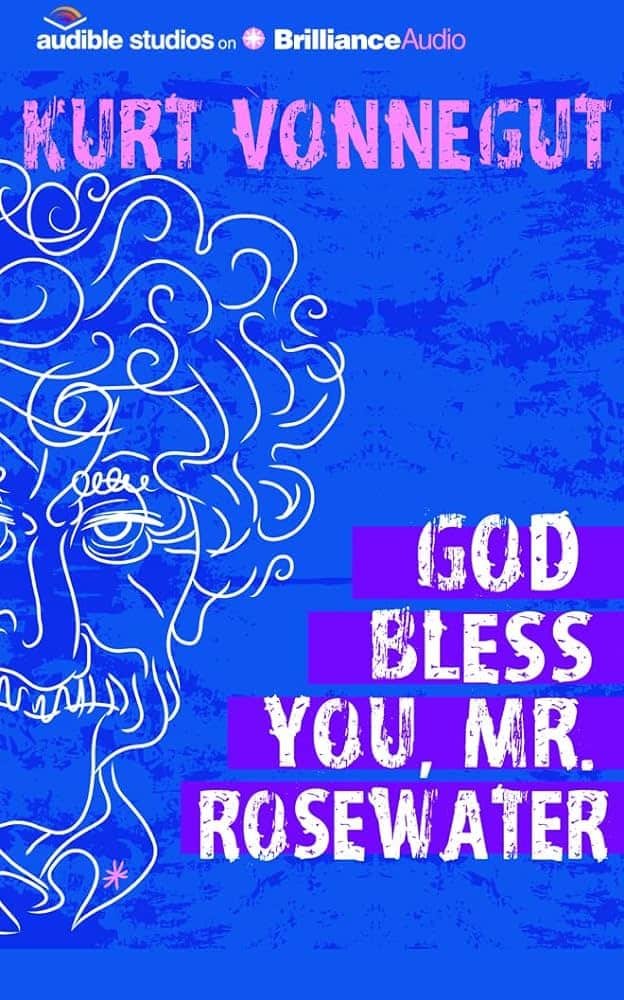For English review, please scroll down.
קרן הנאמנות של משפחת רוזווטר נוסדה בכדי שהיורשים לא יצטרכו לשלם מיסים על נכסי המשפחה. הקרן מקבלת תמלוגים מתאגיד רוזווטר שמנוהל במשרד עורכי דין בניו יורק ומשלמת לאליוט רוזווטר, היורש הישיר 3.5 מליון דולר בשנה.
אליוט, שנלחם במלחמת העולם השניה, אלכוהליסט ומתנדב בשירותי הכבאות, מפתח מצפון חברתי ואחרי שנים שבהן מיצה את חיי העושר, הוא מחליט לחזור למחוז רוזווטר, מחוז בדיוני במערב התיכון של ארה"ב, שם הוא מקים מטה תרומות וסיוע למוכי הגורל וחסרי המזל של המחוז. הוא מקבל שיחות טלפון מאנשים שגורלם לא שפר עליהם. הוא מקשיב לסיפורים האישיים שלהם ומנסה לסייע להם ככל יכולתו וגם לתת להם סיוע כלכלי.
במקביל, אחד מעורכי הדין במשרד שמנהל את התאגיד, נורמן מושארי, משכנע את פרד, בן דוד רחוק של אליוט, שאינו מקבל תמלוגים מהקרן, להכריז על אליוט כלא שפוי. בדרך זו התמלוגים יעברו מהקרן לפרד. אבן נגף אחת עומדת בפניו, נורמן מושארי יצטרך להוכיח בבית משפט שאליוט לא שפוי. אבל מה זו שפיות בעידן של מלחמה קרה וניכור לכל מה שיכול להיחשב אנושי? מי בכלל יכול להיחשב שפוי אחרי ההתעללות והזוועות שהאנושות השיתה על עצמה במלחמת העולם השנייה ועכשיו (שנות ה 60 של המאה ה 20) מאיימת לאדות את עצמה בפצצת אטום?
העלילה נעה בשני צירים: הציר של אליוט, שמנסה למצוא טעם לחייו ע"י חלוקת העושר שנפל בחלקו וסיוע לעניים. הציר השני, מזימתו של נורמן מושארי לגזול מאליוט את כספי הקרן. שני הצירים הללו נפגשי בצורה אבסורדית ומשעשעת בסוף הספר.
בשני הצירים הללו וונגוט עוסק בסוגיות של חלוקת עושר, אשמה, יחסים בין בני משפחה, אי שוויון, חמדנות, שפיות ובריאות נפשית. הוא מעניק קול לקורבנות התיעוש והקפיטליזם שהם לא רק הקורבנות המיידיים והברורים, אותם עניים שפונים לאליוט, אלא גם העשירים בעצמם.
דמותו של אליוט מעוררת רחמים: הוא דמות מוכת גורל בעצמה. החל מהאופן שבו אישתו עוזבת אותו, דרך היחס של אביו כלפיו וכלה ברדיפה שהוא חווה כאשר שפיותו מוטלת בספק. הוא האנטי גיבור הקלאסי. יחד עם זאת, זו דמות מעוררת השראה באומץ שלה, באופן שבו היא מתנכרת לערכים הרקובים של החברה הקפיטליסטית ובאופן שבו הוא מתמודד עם הכדורים שהעולם זורק אליו.
אני חושבת שהספר לא זכה להצלחה מסחררת בארץ, כי אין לנו פה קפיטליזם חזירי שמותיר אוכלוסיות שלמות בחוסר כל וללא רשת סיוע. גם אין לנו את סיגנון התאגידים הדורסניים האמריקאים שמשאירים לאדם שתי ברירות גרועות מאוד: או שאתה איתם. או שאתה נדרס על ידם.
גם הפערים המעמדיים ואי השוויון הכלכלי לא רחבים מאוד (למרות שהם הולכים ומתרחבים).
אני גם חושבת, שעד כמה שהיינו רוצים להיות אמריקה הגדולה, האבולוציה עוד לא הצליחה לשנות את הד.נ.א התרבותי הישראלי, שהוא מאוד שונה מזה האמריקאי. הערבות ההדדית היא ב ד.נ.א שלנו ואף אחד לא יחשוב שאתה מטורף אם תהיה פילנטרופ ותקדיש את חייך לסייע למוכי הגורל.
לפני הספר הזה, לא היתה לי היכרות עם הספרות של וונגוט. סיימתי את הספר כבר לפני שבועיים או שלושה. בזמן קריאת הספר התקשתי להעריך את העומק שלו, לפעמים גם התקוממתי כנגד סיגנון הכתיבה הציני (שלא להגיד מרושע) חשבתי שאדרג אותו ב 3 כוכבים ממוצעים, נהנתי אבל לא עפתי. אבל, בראיה לאחור וככל שהזמן חולף, אני מוצאת את עצמי לפעמים חושבת על המסרים של וונגוט ואני חושבת שזה בדיוק הסימן של ספרות גדולה. ספרות שנראית שטחית, אבל השותלת בקורא זרעים שמתפתחים לשדות של רעיונות ומחשבות.
הגעתי למאמר של מתיו גנון דרך הוויקיפדיה. הוא משווה בין המלט לבין אליוט והניתוח שהוא מציע מרתק וגם מחכים – The Tragedy of Eliot Rosewater, Prince of Indiana
God Bless You, Mr. Rosewater/ Kurt Vonnegut
Kindle Edition, 2011, 290 PP
דירוג SIVI –
איכות אודיו –

The Rosewater family created a trust fund to avoid paying taxes on their assets. The trust receives royalties from the Rosewater Corporation, managed by a law firm in New York. The direct heir, Eliot Rosewater, receives an annual payment of $3.5 million from the foundation.
Eliot, a World War II veteran who struggles with alcoholism, volunteers in the fire service. He develops a social conscience after years of living a life filled with wealth but void of purpose. He returns to Rosewater County, a fictitious county in the Midwest of the United States. He sets up a headquarters to accept donations and assist those in need. Eliot receives phone calls from people who are still struggling and listens to their personal stories. He does his best to help them and even provides financial assistance when possible.
One of the lawyers at the corporation managing the foundation convinces Elliot's distant cousin, Fred, who doesn't receive any royalties from the foundation, to declare Elliot insane. This way, the royalties would go to Fred. However, Norman Moshari, the lawyer, needs to prove in court that Elliot is insane. But in an era of cold war and alienation, what does sanity even mean? After the atrocities of World War II and the threat of nuclear destruction in the 1960s, who can be considered sane?
The book's plot follows two main storylines. The first is Eliot's search for purpose in life by using his wealth to help those in need. The second is Norman Mosheri's plan to steal the money from Eliot's fund. These two storylines ultimately intersect comically and absurdly towards the end of the book.
Vonnegut tackles various issues, such as wealth inequality, guilt, family dynamics, greed, mental health, and social inequality on two axes. He not only represents the poor individuals who resort to Eliot but also highlights how the rich are affected by industrialization and capitalism.
Eliot's character is unfortunate, as he is constantly struck by fate. It all starts with his wife leaving him, followed by his father's behavior towards him, and ends with the persecution he faces when his sanity is questioned. He is the classic anti-hero, but at the same time, his courage is inspiring. He distances himself from the corrupt values of capitalist society and confronts the challenges that life throws at him with bravery.
I believe that the book did not perform well in Israel since we do not have a system of capitalism that exploits entire communities and leaves them without support. Additionally, we do not have the type of aggressive American corporations that force individuals to either comply with them or be destroyed by them.
The economic inequality gap is expanding, but it is still relatively narrow.
Israeli culture remains distinct and unique despite our aspirations to be like America. Our DNA is built on the principle of mutual guarantee, which means that dedicating one's life to philanthropy and helping the less fortunate is widely accepted and respected. You won't be considered crazy for pursuing such a noble cause.
Before reading this book, I had no experience with Vonnegut's literature. I completed the book two or three weeks ago. While reading, I struggled to appreciate its depth fully, and at times, I even found myself rebelling against the cynical and sometimes mean writing style. Consequently, I would have rated it an average of three stars as I enjoyed it but didn't find myself completely captivated by it. However, as time has passed, I have reflected on Vonnegut's messages and ideas, which I believe is a testament to the power of great literature. Even if it may seem superficial initially, it can plant seeds in the reader's mind that can develop into vast fields of thoughts and ideas.
I came across Matthew Gannon's article through Wikipedia. He compares Hamlet and Eliot, and the analysis he offers is both fascinating and waiting – The Tragedy of Eliot Rosewater, Prince of Indiana
לגלות עוד מהאתר Sivi's Books
Subscribe to get the latest posts sent to your email.

